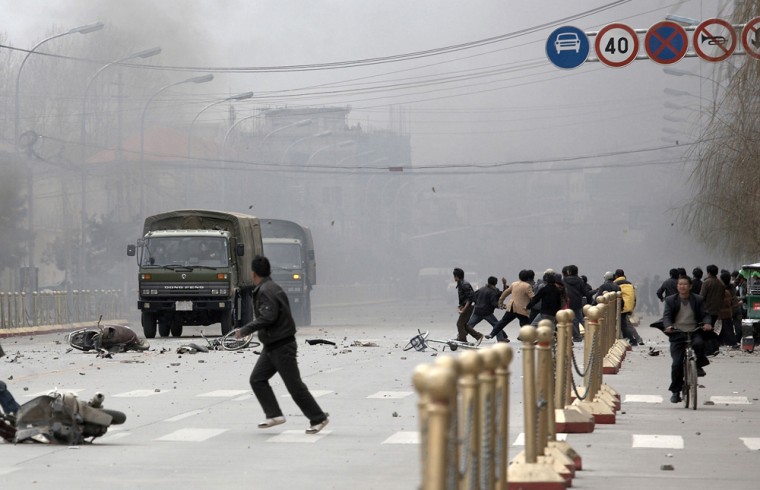There was a tense quiet in Lhasa on Sunday as security forces swarmed through the Tibetan capital enforcing a strict curfew in the wake of a crackdown on violent protests that have drawn negative publicity for China ahead of the Beijing Summer Olympics.
But the city was still far from normal two days after Tibetans torched buildings and stoned Chinese residents in the fiercest challenge to Beijing's rule over the region in nearly two decades.
"It is fairly quiet this morning. The police are patrolling the streets. the local people have been persuaded not to go out," said a man at the Lhasa city government offices.
The man, who refused to give his name, would not say how residents had been persuaded to stay in their homes. He also would not say how many soldiers and police had been deployed in Lhasa.
Olympic celebrations set to start
The violence Friday erupted just two weeks before China's Olympic celebrations kick off with the start of the torch relay, which will pass through Tibet.
China's communist government is hoping Beijing's hosting of the Aug. 8-24 Olympics will boost its popularity at home as well as its image abroad. But the event already has attracted scrutiny of China's human rights record and its pollution problems.
Fresh demonstrations by Tibetan exiles and their supporters sprouted up Saturday in New York, neighboring Nepal, Switzerland and Australia.
International criticism of the crackdown in Tibet so far has been mild without any threats of an Olympic boycott or other sanctions.
U.S. calls for restraint
U.S. Secretary of State Condoleezza Rice called on China "to exercise restraint in dealing with the protests," while the State Department issued a travel alert for Americans in the region.
Rice said she was "concerned by reports of a sharply increased police and military presence in and around Lhasa." Her statement also called for China to release monks and others jailed for protesting.
International Olympic Committee president Jacques Rogge said he opposed an Olympic boycott over Tibet.
"We believe that the boycott doesn't solve anything," Rogge told reporters Saturday on the Caribbean island of St. Kitts. "On the contrary, it is penalizing innocent athletes and it is stopping the organization from something that definitely is worthwhile organizing."
"What is happening in Tibet and Beijing's responses to it will not affect the games very much unless the issue really gets out of control," said Xu Guoqi, a China-born historian at Kalamazoo College in Michigan.
Lhasa mayor blames monks
Lhasa Mayor Doje Cezhug was quoted by China's official Xinhua News Agency as saying the city was calm. "We didn't the enforce martial law there, and the situation in Tibet as a whole is good at present," he said.
He said "the unrest was provoked by a handful of monks and lawless persons engaged in beating, smashing, looting and burning. They burned down schools, hospitals, stores and other public utilities."
The situation in Lhasa depended on where in the city it was. A clerk at the Lhasa Hotel away from the area where the worst violence was said nearby shops were open and guests were allowed to leave.
But a woman in another area of the city, who refused to give her name, said "the police told us not to leave our homes."
The unrest in Tibet began last Monday on the anniversary of a 1959 uprising against Chinese rule of the region. Tibet was effectively independent for decades before communist troops entered in 1950.
The protests initially were led by Buddhist monks demanding the release of other detained monks. Their demands spiraled to include cries for Tibet's independence and turned violent when police tried to stop a group of protesting monks. Pent-up grievances against Chinese rule came to the fore, as Tibetans directed their anger against Chinese and their shops, hotels and other businesses.
Xinhua reported at least 10 civilians were burned to death Friday. The Dalai Lama's exiled Tibetan government in India said Chinese authorities killed at least 30 Tibetans and possibly as many as 100. The figures could not be independently verified as China restricts foreign media access to Tibet.
But the details emerging from witness accounts and government statements suggested Beijing was preparing a methodical campaign — one that if carefully modulated would minimize bloodshed and avoid wrecking Beijing's grand plans for the Olympics.
Show of force
Police in Lhasa manned checkpoints, and armored personnel carriers rattled on mostly empty streets as people stayed indoors under a curfew, witnesses said. The show of force imposed a tense quiet.
"There are military blockades blocking off whole portions of the city, and the entire city is basically closed down," said a 23-year-old Canadian student who arrived in Lhasa on Saturday and who was making plans to leave. "All the restaurants are closed, all the hotels are closed."
Law-enforcement agencies in Lhasa issued a notice offering leniency for demonstrators who surrender before the end of Monday and threatening severe punishment for those who do not.
The calculated mix of threats and inducements underscored the difficulties the communist leadership faces in trying to quell a serious challenge to its 57-year rule in Tibet while saving this year's Summer Olympics.
